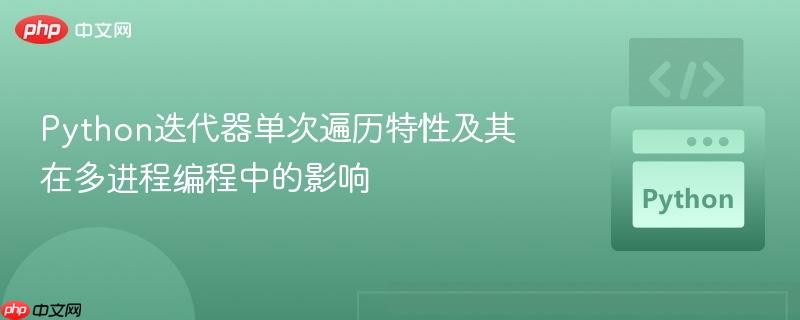
本文深入探讨了python迭代器的核心特性——单次遍历,并解释了这一特性如何导致在多进程编程中出现意想不到的行为,例如原本应抛出的错误因迭代器被提前耗尽而“神秘”消失。通过具体代码示例,文章揭示了迭代器耗尽的原理,并提供了在多进程环境下正确使用迭代器的最佳实践,以避免潜在的问题并确保程序逻辑的准确性。
Python中的迭代器(iterator)是一种允许按需访问序列元素的对象。它们实现了迭代器协议,即包含 __iter__() 和 __next__() 方法。迭代器的核心特点是“一次性消费”:一旦迭代器被遍历完,它就耗尽了,无法再次生成元素。例如,zip() 函数返回的就是一个迭代器,它将多个可迭代对象组合成一个单一的迭代器。
为了直观理解这一特性,请看以下示例:
x = (0, 1, 2)
y = "ABC"
zipper = zip(x, y)
print(f"原始zipper对象: {zipper}") # 输出: <zip object at ...>
# 第一次遍历:通过list()函数完全消费迭代器
first_pass_list = list(zipper)
print(f"第一次遍历(通过list())后的结果: {first_pass_list}") # 输出: [(0, 'A'), (1, 'B'), (2, 'C')]
# 尝试第二次遍历:迭代器已耗尽
second_pass_list = list(zipper)
print(f"第二次遍历后的结果: {second_pass_list}") # 输出: [] (空列表)
# 尝试通过for循环遍历一个已耗尽的迭代器
print("尝试通过for循环遍历已耗尽的zipper:")
for n, s in zipper:
print(n, s) # 不会输出任何内容从上述示例可以看出,一旦 list(zipper) 被调用,zipper 迭代器就被完全耗尽。随后对其进行的任何遍历尝试都将得到空结果。
在多进程编程中,尤其是在使用 multiprocessing.Pool.starmap 等方法时,如果任务的输入是一个迭代器,其一次性消费的特性可能会导致令人困惑的现象。考虑以下代码片段,它尝试使用 starmap 在多进程中执行 func:
立即学习“Python免费学习笔记(深入)”;
from itertools import repeat
import multiprocessing
# 辅助函数:将args和kwargs应用于目标函数
def apply_args_and_kwargs(fn, args, kwargs):
return fn(*args, **kwargs)
# 实际执行任务的函数,存在潜在的TypeError
def func(path, dictArg, **kwargs):
# 这里的循环和索引访问方式会导致TypeError
# 因为dictArg是字典,for i in dictArg会遍历其键(字符串)
# 随后 i['a'] 尝试对字符串进行字符串索引,导致TypeError
for i in dictArg:
print(i['a']) # TypeError: string indices must be integers
print(kwargs['yes'])
# 包装函数,设置并启动多进程任务
def funcWrapper(path, dictList, **kwargs):
args_iter = zip(repeat(path), dictList)
kwargs_iter = repeat(kwargs)
# 关键行:如果取消注释,args_iter将被提前耗尽
# list(args_iter)
pool = multiprocessing.Pool()
# 为starmap准备参数:(func, args, kwargs)
args_for_starmap = zip(repeat(func), args_iter, kwargs_iter)
pool.starmap(apply_args_and_kwargs, args_for_starmap)
pool.close()
pool.join()
# 测试数据
dictList = [{'a: 2'}, {'a': 65}, {'a': 213}, {'a': 3218}] # 注意:这些是字典,键是'a: 2'等
path = 'some/path/to/something'
print("--- 场景一:不提前耗尽迭代器 ---")
try:
funcWrapper(path, dictList, yes=1)
except TypeError as e:
print(f"捕获到预期TypeError: {e}")
# 预期输出类似:
# TypeError: string indices must be integers
# ... (追溯信息)
print("\n--- 场景二:提前耗尽迭代器 ---")
# 重新准备数据,确保迭代器是新的
dictList_case2 = [{'a: 2'}, {'a': 65}, {'a': 213}, {'a: 3218}]
path_case2 = 'some/path/to/something'
# 模拟用户在调用funcWrapper前,意外地耗尽了迭代器
temp_args_iter = zip(repeat(path_case2), dictList_case2)
_ = list(temp_args_iter) # 这一行将temp_args_iter完全耗尽
print("temp_args_iter 已被 list() 调用耗尽。")
# 现在调用funcWrapper,即使内部会重新创建zip,但由于dictList_case2是可迭代的,
# 这里的模拟方式需要更精确。更直接的模拟是修改funcWrapper,让它接收一个已耗尽的迭代器。以上就是Python迭代器单次遍历特性及其在多进程编程中的影响的详细内容,更多请关注php中文网其它相关文章!

编程怎么学习?编程怎么入门?编程在哪学?编程怎么学才快?不用担心,这里为大家提供了编程速学教程(入门课程),有需要的小伙伴保存下载就能学习啦!

Copyright 2014-2025 https://www.php.cn/ All Rights Reserved | php.cn | 湘ICP备2023035733号